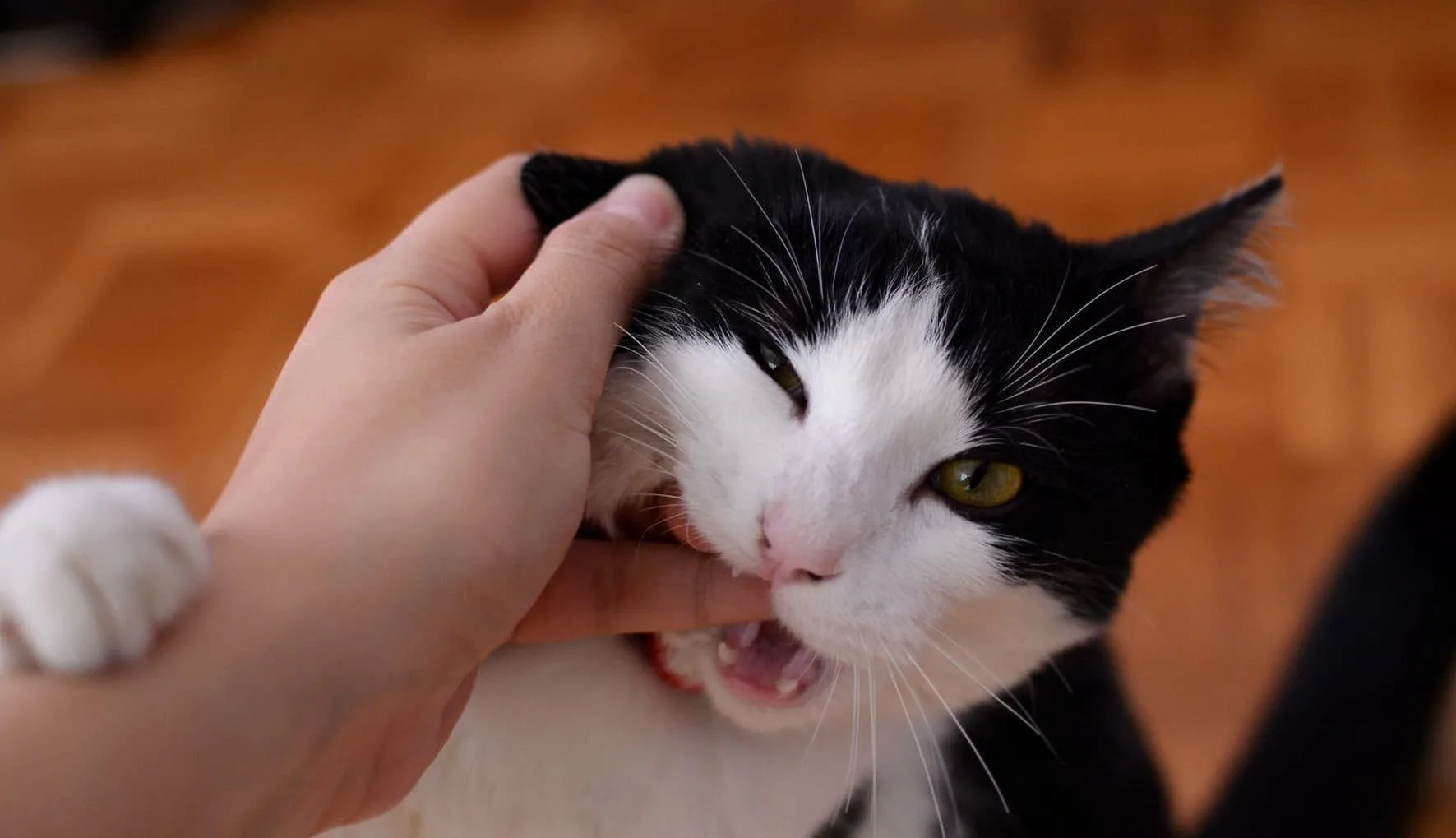Cat bites are one of the most confusing parts of being a cat owner – one second your cat is purring while being pet, and the next second he/she nips your hand! But why?
You might feel hurt by the bite, or even rejected, but you’re not alone. There isn’t one general answer for why cats bite.
Like most cat behavior, the reason for biting really just depends.
Keep reading to learn each individual circumstance a cat may bite!
1. Overstimulation
Cats have a tendency to bite or swat when they are overstimulated from petting. Most cats will give you warning signs that they are being overstimulated.
Here are some signs that you cat is starting to get overstimulated: a fast swishing tail, rotating ears, tense body, and dilated pupils.
The best way to prevent overstimulation is to be gentle and pay attention to signs of overstimulation before your kitty reacts.
Experiment with petting different areas your cat responds better to. Also, always pet your cat in the direction it’s fur grows – cats do NOT like to be pet backwards.
RELATED:Why Do Cats Put Their Butts In Our Faces?
2. Love Bites
Sometimes your cat will communicate with you by giving you a gentle bite. Love bites don’t usually break the skin and they’re gentle.
It isn’t uncommon for your kitty to give you a light nibble on the ankle to remind you that it’s mealtime or gently bite your hand when he/she wants to be pet.
Deciphering the reason behind a cat’s bite can be tricky. The bite depends the specific scenario, so it’s important to pay attention to everything leading up to a bite.
SURVEY: Do You Consider Cats Family?
Your opinion matters!
3. Violent Aggression
Real bites are often accompanied by hissing, growling, and an arched back. Look at the context to determine why your cat is demonstrating violent aggression.
For example, if there is a loud noise or your cat feels threatened, the bite that results is most likely a product of fear.
However, aggressive encounters should not be very common. It is not normal for healthy cats to be fearful and aggressive all the time.
If your cat demonstrates violent aggression frequently, take them to a veterinarian to determine if your cat has an underlying medical condition that is causing them to behave aggressively.
4. They’re Kittens
It’s natural for kittens to play rough with their owners or other cats. Kittens have an innate desire to stalk, pounce, swat, and bite. This helps them develop physical coordination and learn more about their environment.
Kitten owners may get confused and misinterpret this as aggressive behavior directed towards them, but don’t worry – it’s all in good fun.
Kitten owners may also fear that this aggressive behavior will follow their kittens into adulthood, however, it is simply a playful stage and kittens will eventually “calm down” as they get older.
5. Playful Aggression
Playful aggression is very common and is usually the result of boredom. For example, if you are your cat’s only playmate, then he/she is most likely just playing with you when he/she bites.
If you’ve ever seen two cats play together, they aren’t exactly gentle. An only-child cat doesn’t have a special standard for humans when it comes to play. They have to be trained not to demonstrate aggression, even when it is playful.
Remember that cats and dogs demonstrate emotion and playfulness differently. They have different instincts and different ways to express their needs and emotions.
IMPORTANT: Never scold or punish your cats when they try playing rough with you. Instead, try using some of these methods to reduce aggressive behavior.
How to Prevent Your Cat From Biting You
- Provide them with toys. Cats like small objects they can chase and swat like prey. Ping pong balls, mice, and small plushy toys are good choices.
- Teach them how to play with you. Spend 15-20 minutes each day entertaining your cat with toys and teaching them how to play with you without biting. This is especially true for inside cats. Use toys that can be dangled or thrown to encourage your cat to play with the toy and not your hands and feet.
- Build a playground. If your cat is an inside cat, research making an enclosed playground with boxes and other objects for them to explore.
- Discourage biting. If your cat bites you during playtime, immediately stop playing with them and go to another room. It will show them you don’t respond to biting and encourage them to play gentle if they want to continue.
- Never hit your cat. Instead, use a loud and negative tone of voice to let them know you are unhappy after a bite. Cats respond to volume and tone.
- Reward them for playing without biting you. Give them treats each time they resist an opportunity to bite.
- Consider adopting a play-mate for your cat. Adopting another cat that communicates the same way could relieve some tension. They could play together instead of playing rough with you.
PRO TIP: Anti-Bite Spray
The best way to train your cat to stop biting you or your possessions is to use an anti-bite/chew spray like the one pictured below.
This spray is bitter and discourages kitties from biting, chewing, or licking things they shouldn’t. It’s all natural, non-toxic, and made in the USA.
#1 Rule to Remember: Be Consistent
You can’t decide when biting is cute or annoying depending on your mood.
This will confuse your cat and they will continue to bite. For the best results, stay consistent with your response to biting and your kitty will be tamed!
RELATED: Why Cats Knock Stuff Over – Science Explained
Summary: Why Does My Cat Bite Me?
- Overstimulation
- Love bites
- Lack of activity/boredom
- Playful Aggression
- Violent Aggression
QUESTION: Does your cat bite you sometimes? Now that you’ve read all the causes, why do you think your cat bites you?




Sharlene
Monday 18th of November 2019
Valuable info, thank you so much! :-)
Anne Marcum
Monday 18th of November 2019
When Max wants additional food, he'll sometimes attack my foot or ankle, giving a light bite, never hurting me. His ears are back and he gets a wild look in his eyes. I've started carting him off to the laundry room and shutting him in there for a few minutes. That stops his bad behaviour. Max just loves to eat and believes himself to be starved every morning and evening. Since he weighs 15 pounds, he isn't in danger of iminent starvation!
Florence Eaise
Thursday 12th of September 2019
I've learned a great trick over the years of working with kittens and cats in the shelter I work at as well as the feral and stray cats I work with at home. I put a lotion with a citrus scent on my hands. Cats despise citrus scents such as lemon and orange. In a pinch you can even use the juice of the fruit or rub the peels on your hands. Kitty wont want that taste at all! I NEVER Strike or yell at a cat. That's not the proper way to train at all.